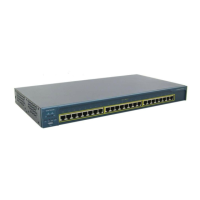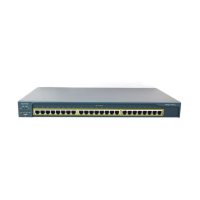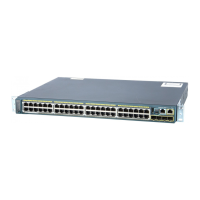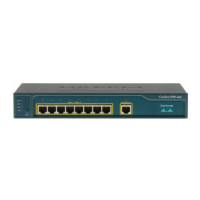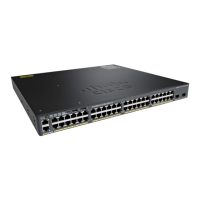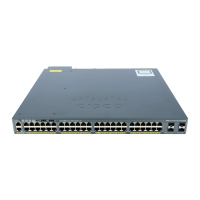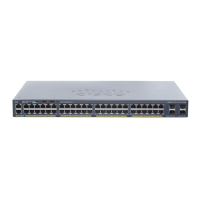2-5
Catalyst 2950 and Catalyst 2955 Switch Command Reference
OL-10102-01
Chapter 2 Catalyst 2950 and 2955 Cisco IOS Commands
access-list (IP extended)
access-list (IP extended)
Use the extended version of the access-list global configuration command to configure an extended IP
access control list (ACL). Use the no form of this command to remove an extended IP ACL.
access-list access-list-number {deny | permit | remark} protocol {source source-wildcard |
host source | any} [operator port] {destination destination-wildcard | host destination | any}
[operator port] [dscp dscp-value] [time-range time-range-name]
no access-list access-list-number
This command is available on physical interfaces only if your switch is running the enhanced software
image (EI).
Syntax Description access-list-number Number of an ACL. The range is 100 to 199 and 2000 to 2699.
protocol Name of an IP protocol.
protocol can be ip, tcp, or udp.
deny Deny access if conditions are matched.
permit Permit access if conditions are matched.
remark ACL entry comment up to 100 characters.
source source-wildcard |
host source | any
Define a source IP address and wildcard.
The source is the source address of the network or host from which the
packet is being sent, specified in one of these ways:
• The 32-bit quantity in dotted-decimal format. The source-wildcard
applies wildcard bits to the source.
• The keyword host, followed by the 32-bit quantity in dotted-decimal
format, as an abbreviation for source and source-wildcard of source
0.0.0.0.
• The keyword any as an abbreviation for source and source-wildcard
of 0.0.0.0 255.255.255.255. You do not need to enter a
source-wildcard.
destination
destination-wildcard |
host destination | any
Define a destination IP address and wildcard.
The destination is the destination address of the network or host to which
the packet is being sent, specified in one of these ways:
• The 32-bit quantity in dotted-decimal format. The
destination-wildcard applies wildcard bits to the destination.
• The keyword host, followed by the 32-bit quantity in dotted-decimal
format, as an abbreviation for destination and destination-wildcard
of destination 0.0.0.0.
• The keyword any as an abbreviation for destination and
destination-wildcard of 0.0.0.0 255.255.255.255. You do not need to
enter a destination-wildcard.
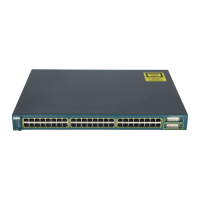
